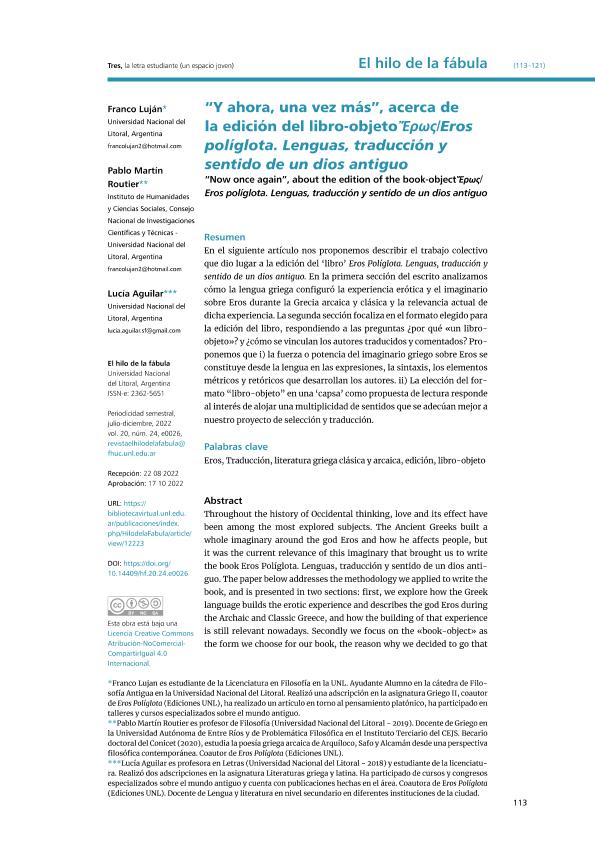Mostrar el registro sencillo del ítem
dc.contributor.author
Luján, Franco
dc.contributor.author
Routier, Pablo Martín

dc.contributor.author
Aguilar, Lucía
dc.date.available
2023-11-03T15:07:41Z
dc.date.issued
2022-10
dc.identifier.citation
Luján, Franco; Routier, Pablo Martín; Aguilar, Lucía; “Y ahora, una vez más”, acerca de la edición del libro-objeto Ἔρως/Eros políglota: Lenguas, traducción y sentido de un dios antiguo; Universidad Nacional del Litoral. Centro de Estudios Comparados; El Hilo de la Fábula; 20; 24; 10-2022; 113-121
dc.identifier.issn
1667-7900
dc.identifier.uri
http://hdl.handle.net/11336/216943
dc.description.abstract
En el siguiente artículo nos proponemos describir el trabajo colectivo que dio lugar a la edición del ‘libro’ Eros Políglota. Lenguas, traducción y sentido de un dios antiguo. En la primera sección del escrito analizamos cómo la lengua griega configuró la experiencia erótica y el imaginario sobre Eros durante la Grecia arcaica y clásica y la relevancia actual de dicha experiencia. La segunda sección focaliza en el formato elegido para la edición del libro, respondiendo a las preguntas ¿por qué «un libro-objeto»? y ¿cómo se vinculan los autores traducidos y comentados? Proponemos que i) la fuerza o potencia del imaginario griego sobre Eros se constituye desde la lengua en las expresiones, la sintaxis, los elementos métricos y retóricos que desarrollan los autores. ii) La elección del formato “libro-objeto” en una ‘capsa’ como propuesta de lectura responde al interés de alojar una multiplicidad de sentidos que se adecúan mejor a nuestro proyecto de selección y traducción.
dc.description.abstract
Throughout the history of Occidental thinking, love and its effect have been among the most explored subjects. The Ancient Greeks built a whole imaginary around the god Eros and how he affects people, but it was the current relevance of this imaginary that brought us to write the book Eros Políglota. Lenguas, traducción y sentido de un dios antiguo. The paper below addresses the methodology we applied to write the book, and is presented in two sections: first, we explore how the Greek language builds the erotic experience and describes the god Eros during the Archaic and Classic Greece, and how the building of that experience is still relevant nowadays. Secondly we focus on the «book-object» as the form we choose for our book, the reason why we decided to go that way and how the decision is related to the original passages we translated. We suggest that: i) The power of the Greek imaginary over Eros is built from the language in the expressions, grammar, metrics and rhetoric developed by the authors we translated; ii) The decision to use a book-object in the form of a capsa as a reading proposal responds to the interest of accommodating a multiplicity of meanings that are best suited in this format to our selection and translation project.
dc.format
application/pdf
dc.language.iso
spa
dc.publisher
Universidad Nacional del Litoral. Centro de Estudios Comparados
dc.rights
info:eu-repo/semantics/openAccess
dc.rights.uri
https://creativecommons.org/licenses/by-nc-sa/2.5/ar/
dc.subject
Eros
dc.subject
Traducción
dc.subject
Libro-objeto
dc.subject
Literatura griega clásica y arcaica
dc.subject.classification
Otras Lengua y Literatura

dc.subject.classification
Lengua y Literatura

dc.subject.classification
HUMANIDADES

dc.title
“Y ahora, una vez más”, acerca de la edición del libro-objeto Ἔρως/Eros políglota: Lenguas, traducción y sentido de un dios antiguo
dc.title
“Now once again”, about the edition of the book-object Ἔρως/ Eros políglota: Lenguas, traducción y sentido de un dios antiguo
dc.type
info:eu-repo/semantics/article
dc.type
info:ar-repo/semantics/artículo
dc.type
info:eu-repo/semantics/publishedVersion
dc.date.updated
2023-11-02T14:38:15Z
dc.identifier.eissn
2362-5651
dc.journal.volume
20
dc.journal.number
24
dc.journal.pagination
113-121
dc.journal.pais
Argentina

dc.journal.ciudad
Santa Fe
dc.description.fil
Fil: Luján, Franco. Universidad Nacional del Litoral; Argentina
dc.description.fil
Fil: Routier, Pablo Martín. Universidad Nacional del Litoral. Instituto de Humanidades y Ciencias Sociales del Litoral. Consejo Nacional de Investigaciones Científicas y Técnicas. Centro Científico Tecnológico Conicet - Santa Fe. Instituto de Humanidades y Ciencias Sociales del Litoral; Argentina
dc.description.fil
Fil: Aguilar, Lucía. Universidad Nacional del Litoral; Argentina
dc.journal.title
El Hilo de la Fábula
dc.relation.alternativeid
info:eu-repo/semantics/altIdentifier/url/https://bibliotecavirtual.unl.edu.ar/publicaciones/index.php/HilodelaFabula/article/view/12223
dc.relation.alternativeid
info:eu-repo/semantics/altIdentifier/doi/http://dx.doi.org/10.14409/hf.20.24.e0026
Archivos asociados
